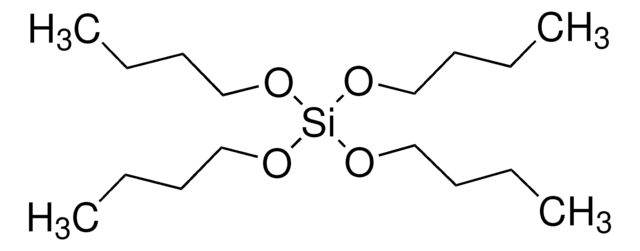333859
Tetraethyl orthosilicate
99.999% trace metals basis
Synonym(s):
Orthosilicic acid tetraethyl ester, Silicon tetraethoxide, TEOS, Tetraethoxysilane, Tetraethoxysilicon(IV), Tetraethyl silicate
About This Item
Recommended Products
vapor density
7.2 (vs air)
vapor pressure
<1 mmHg ( 20 °C)
Assay
99.999% trace metals basis
form
liquid
refractive index
n20/D 1.382 (lit.)
bp
168 °C (lit.)
density
0.933 g/mL at 20 °C (lit.)
SMILES string
CCO[Si](OCC)(OCC)OCC
InChI
1S/C8H20O4Si/c1-5-9-13(10-6-2,11-7-3)12-8-4/h5-8H2,1-4H3
InChI key
BOTDANWDWHJENH-UHFFFAOYSA-N
Looking for similar products? Visit Product Comparison Guide
Related Categories
General description
Application
Signal Word
Warning
Hazard Statements
Precautionary Statements
Hazard Classifications
Acute Tox. 4 Inhalation - Eye Irrit. 2 - Flam. Liq. 3 - STOT SE 3
Target Organs
Respiratory system
Storage Class Code
3 - Flammable liquids
WGK
WGK 1
Flash Point(F)
113.0 °F - closed cup
Flash Point(C)
45 °C - closed cup
Personal Protective Equipment
Certificates of Analysis (COA)
Search for Certificates of Analysis (COA) by entering the products Lot/Batch Number. Lot and Batch Numbers can be found on a product’s label following the words ‘Lot’ or ‘Batch’.
Already Own This Product?
Find documentation for the products that you have recently purchased in the Document Library.
Customers Also Viewed
Articles
From Form to Function: Molding Porous Materials in Three Dimensions by Colloidal Crystal Templating
Reactive silicone chemistry: Focus on pure silicon production, polymerizations, and controlled stereochemistry reactions.
Mesoporous materials, such as aerogels, offer advantages for practical hydrogen storage. They have large surface areas, open porosity, small pore sizes, and the ability to coat the surface with one or more compounds.
Recent demand for electric and hybrid vehicles, coupled with a reduction in prices, has caused lithium-ion batteries (LIBs) to become an increasingly popular form of rechargeable battery technology.
Our team of scientists has experience in all areas of research including Life Science, Material Science, Chemical Synthesis, Chromatography, Analytical and many others.
Contact Technical Service














